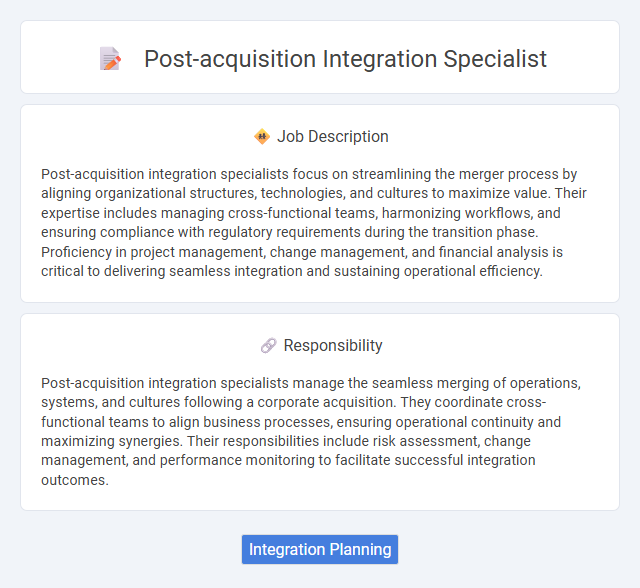
Post-acquisition integration specialists focus on streamlining the merger process by aligning organizational structures, technologies, and cultures to maximize value. Their expertise includes managing cross-functional teams, harmonizing workflows, and ensuring compliance with regulatory requirements during the transition phase. Proficiency in project management, change management, and financial analysis is critical to delivering seamless integration and sustaining operational efficiency.
Individuals with strong analytical skills and adaptability are likely to thrive as post-acquisition integration specialists, given the complex and dynamic nature of merging companies. Those who prefer structured, routine tasks may not find the role suitable due to the ongoing need to manage diverse teams and navigate shifting organizational cultures. Candidates who handle stress well and communicate effectively across departments probably have a higher chance of success in this position.
Qualification
A Post-Acquisition Integration Specialist typically holds a bachelor's degree in business administration, finance, or management, with advanced qualifications such as an MBA often preferred. Expertise in change management, project management certifications like PMP, and strong analytical skills are essential for aligning business processes and cultures post-merger. Proven experience in cross-functional collaboration, financial analysis, and strategic planning ensures effective integration and value realization post-acquisition.
Responsibility
Post-acquisition integration specialists manage the seamless merging of operations, systems, and cultures following a corporate acquisition. They coordinate cross-functional teams to align business processes, ensuring operational continuity and maximizing synergies. Their responsibilities include risk assessment, change management, and performance monitoring to facilitate successful integration outcomes.
Benefit
A post-acquisition integration specialist likely enhances the efficiency of merging business operations by minimizing disruption and aligning corporate cultures, which can lead to improved employee retention and sustained productivity. This role probably increases the likelihood of achieving anticipated synergies, thereby maximizing the return on investment for the acquiring company. Companies might experience faster realization of value and reduced costs due to smoother integration processes facilitated by this specialist.
Challenge
Post-acquisition integration specialists likely face significant challenges in aligning divergent corporate cultures, which can create resistance among teams and hinder collaboration. The complexity of synchronizing IT systems and operational processes may pose frequent obstacles that require meticulous planning and adaptation. Managing stakeholder expectations while minimizing disruption to ongoing business activities probably demands advanced communication and problem-solving skills to ensure a smooth transition.
Career Advancement
Post-acquisition integration specialists play a critical role in blending business operations, culture, and systems after mergers or acquisitions, ensuring seamless transitions and value realization. Mastery in project management, change management, and cross-functional collaboration significantly boosts career advancement opportunities in corporate development or strategic consulting sectors. Gaining certifications like PMI-ACP or Prosci and accumulating hands-on experience with diverse integration frameworks accelerates progression to senior leadership roles.
Key Terms
Integration Planning
Post-acquisition integration specialists develop detailed integration plans to ensure seamless alignment of acquired companies with existing business operations. They focus on synchronizing processes, systems, and corporate cultures to maximize synergies and minimize disruption. Effective integration planning includes risk assessment, resource allocation, and milestone tracking to achieve strategic acquisition goals.
 kuljobs.com
kuljobs.com